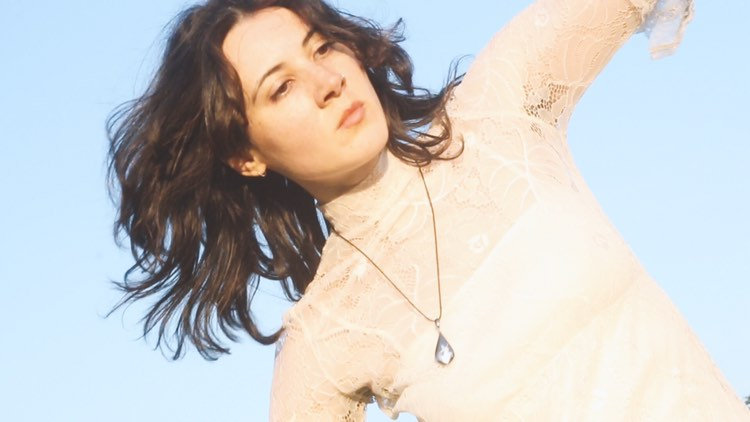Trust me, as someone who’s written about music for nigh on twenty years, there’s no shortage of singer-songwriters out there. So when one comes along who actually stands out from the pack, it’s a cause for celebration. Kim Grant, who fronts the shoegaze meets folk act Raveloe is as original an act as I have heard in many years.
She’s just released her debut album, the appropriately entitled Exit Light, which sums up the wonderfully autumnal sound within the record. I spoke to her a couple of weeks ago about the album. When I speak to her via Zoom, she’s having a cosy night in and gearing up for the release of the album, which has kept her busy of late.
I start by asking how Raveloe came into being.
“I decided to end my previous project Tongue Trap in 2019. [In that group] I did most of the song writing as a couple of friends did write one or two songs,” she explains. As for Raveloe, “It’s more of a vehicle for me to write my own songs, and for me to play solo as well as with a band. In Tonguetrap it was always a band. This [Raveloe] was my world that I was creating.”
Raveloe the name comes from George Eliot’s novel Silas Marner, a novel about a reclusive weaver who lives in a town called Raveloe. But what about Raveloe the band? Is it a regular line-up? “It’s slightly shifting, rather than very different, I would say,’ she reflects. ‘It’s just varied, all along the way.”
Things started to take shape once COVID-19 meant normality was put on hold for all of us. She explains: “I did a lot of writing over lockdown, and some of those songs have made their way onto this album. I did do a lot of the writing alone, but there was still a big element of collaboration even then, for example a lot of the songs I did remotely with my friend Jacob. He was sending me drum parts and then I was mixing them. Also, [fellow Glasgow musician], Jason Riddell recorded one of the songs in a studio, I think that must have been just before lockdown,” she recalls.
She’s been releasing singles as Raveloe for a couple of years now, going back to ‘Anthem’ in late 2020. “I did the EP [Notes And Dreams], and then got into the studio to work on the other singles.” Along the way, she started working with Glasgow indie label Olive Grove.
“It was during the Govanhill Music Festival,’ she explains, ‘I was playing in a little park and it was still during COVID times, and it was the perfect opportunity for Lloyd [Meredith, Olive Grove label owner] to come along. His son was playing in a play park, listening in. At the end of that gig, I think Lloyd just wanted to be like ‘Hello’ and introduce himself and keep it quite casual. But his son was like ‘My dad runs a record label!”‘ she laughs. “So that was how it all started.”
“I wasn’t sure if anything would come of it,” she adds, “and then, sure enough, he messaged me ‘I would like to work with you.’ I was over the moon, because it was it really exciting at that time to be creating something in its early stages, and for someone to get on board with that.”
She has a tour coming up, she describes as being “very shoestring” –“basically I’m just booking it all myself, it’s all just through friends.” Gigs in December will include London and Skye (the latter which she’s really excited about), as well as playing on the same bill as Edinburgh’s slowcore heroes eagleowl at the Lost Map special at Edinburgh’s Summerhall venue. “It’s going to be a busy sort of winter time, which I’m excited about,” she says.
I move onto asking about her early life. Now based in Glasgow, she grew up “in a small town called Motherwell” which she describes as being ex-mining and post-industrial. She left home “quite young” at the age of sixteen, wanting to experience a little more of life and not feel, in her words “a misfit.” She went down south for a year, then came back up to Scotland, living first in Edinburgh before settling in Glasgow. “I used to always go through to Glasgow when I lived in Motherwell…Glasgow just seemed to be drawing me back the whole time.” Tongue Trap was the first band she formed, formed in Edinburgh because she went to an organisation called Girls Rock School in Edinburgh. She and her best friend of the time, and another girl called Sam, which was how that group came into being.
I ask when the album started to come together. She admits that it had always been her dream to make an album, some songs that she started to write during lockdown and others that came into being, even in the process of recording. “In 2022, there were a lot of songs that I was writing, that met with the old and the new and they all became the album.” The album was finished in December last year, which she describes as making for quite a journey until now and getting the album out.
“Lloyd’s been there from the very beginning of Raveloe, so he was there through the EP being released, and we’d discussed doing an album one day, so he had my back like that.” She adds: “It was actually getting funding from Creative Scotland that really helped the process, because it allowed me to be in a studio and work with my friends who are musicians and pay them for their valuable time.”
I ask what the plans for 2024 are for Raveloe. “I’m excited to start off the year with my first headline for Celtic Connections,” she reveals, which will be taking place at the city’s famed Hug and Pint venue and will be a full band show. (Last year she played Celtic Connections supporting Stina Marie Claire from Honeyblood). “I just want to keep on playing, I want to do more booking tours, playing anywhere and everywhere that I can.” She sees this as the advantage of both playing solo or with the full band, “I can just grab my guitar and get on a bus or a train.” She’s continuing to write new songs, so hopes to be able to get back into the studio, or at least make some demos from home.
Given the great DIY culture music scene, I play devil’s advocate and ask if she’s ever been tempted to move to London. “I’ve heard that a lot,” she considers. “You should go to London if you really want to say in brackets ‘make it’ (she makes quotation marks with her fingers here), but I suppose my definition of making it is murky anyway. I just want to make music because I love doing it in whatever shape that is. If I can do it regularly, playing in different places, I’m happy, that’s me! I think I can do that in Scotland because there is such an amazing community here. I’m very happy here,“ she says in conclusion.
I put forward the view that twenty years ago when Franz Ferdinand made it big, it was a boost to the musical community, just as when the Proclaimers sang, almost defiantly, in their own accents, and she concurs. I suggest what can be more of a challenge within Scotland is the difficulty of establishing yourself as an act in more than one place, that it can be easy to get gigs in your home city, but a struggle elsewhere in Scotland. “There is inter-connectiveness,” she says, reflectively, “but there is still a large amount of separation, which is quite surprising considering that Scotland is such a small country.” She suggests that more effort needs to go into connecting up these cities, and also points out that it’s not just about what happens in Edinburgh and Glasgow –“there’s great stuff happening in Stirling.”
She’s now played many of the venues in Glasgow and adds “obviously I’d like to play the Barrowlands one day” saying that she likes it as it’s still family run. It is, of course, an iconic venue and for Glasgow acts particularly, headlining the venue is a sign that you have reached a certain level of success. Right now, the reviews are starting to come in, and it’s clear I’m not the only one thinking this is a rather special record. Here’s to a well-deserved success.




